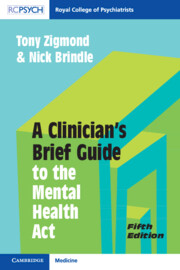Book contents
- A Clinician’s Brief Guide to the Mental Health Act
- A Clinician’s Brief Guide to the Mental Health Act
- Copyright page
- Contents
- Preface to the First Edition
- Preface to the Second Edition
- Preface to the Third Edition
- Preface to the Fourth Edition
- Preface to the Fifth Edition
- List of Abbreviations
- Chapter 1 Setting the Scene, Statutory Law and the Common Law
- Chapter 2 The Human Rights Act in Clinical Practice
- Chapter 3 Capacity: The Mental Capacity Act and Deprivation of Liberty Safeguards
- Chapter 4 The Mental Health Act
- Chapter 5 The Mental Health Act: Part II (Civil Sections)
- Chapter 6 The Mental Health Act: Part III (Sections Relating to Courts and Prisons)
- Chapter 7 Community Treatment Orders
- Chapter 8 The Mental Health Act: Part IV (Consent to Treatment)
- Chapter 9 Appeals against Detention/Compulsion
- Chapter 10 Special Provisions in Relation to Minors
- Chapter 11 How to Become Section 12 Approved and/or an Approved Clinician
- Chapter 12 Reform of the Mental Health Act for England
- Book part
- References
- Index
Chapter 2 - The Human Rights Act in Clinical Practice
Published online by Cambridge University Press: 03 June 2022
- A Clinician’s Brief Guide to the Mental Health Act
- A Clinician’s Brief Guide to the Mental Health Act
- Copyright page
- Contents
- Preface to the First Edition
- Preface to the Second Edition
- Preface to the Third Edition
- Preface to the Fourth Edition
- Preface to the Fifth Edition
- List of Abbreviations
- Chapter 1 Setting the Scene, Statutory Law and the Common Law
- Chapter 2 The Human Rights Act in Clinical Practice
- Chapter 3 Capacity: The Mental Capacity Act and Deprivation of Liberty Safeguards
- Chapter 4 The Mental Health Act
- Chapter 5 The Mental Health Act: Part II (Civil Sections)
- Chapter 6 The Mental Health Act: Part III (Sections Relating to Courts and Prisons)
- Chapter 7 Community Treatment Orders
- Chapter 8 The Mental Health Act: Part IV (Consent to Treatment)
- Chapter 9 Appeals against Detention/Compulsion
- Chapter 10 Special Provisions in Relation to Minors
- Chapter 11 How to Become Section 12 Approved and/or an Approved Clinician
- Chapter 12 Reform of the Mental Health Act for England
- Book part
- References
- Index
Summary
Understanding European institutions isn’t easy or, thankfully, necessary here. Our concern is with the European Convention on Human Rights and Fundamental Freedoms. This was adopted by the Council of Europe (a group of 42 states) in 1951. The United Kingdom was one of the first signatories to the Convention. Although prior to 2000, when the Human Rights Act 1998 (HRA) came into force, ‘public authorities’ (the term used to describe ‘the State’) and private institutions providing public functions were supposedly obliged to comply with the European Convention of Human Rights, it was difficult in practice for an aggrieved person to obtain a judgment because they needed to exhaust all domestic legal remedies before they could appeal to the European Convention of Human Rights. The Human Rights Act changed this. Parliament is required to ensure that its laws are compliant with the European Convention of Human Rights, and courts and other public authorities are required to interpret Acts in line with the Convention as far as possible. European Court of Human Rights judgments are applicable in UK courts (although not binding).
- Type
- Chapter
- Information
- A Clinician's Brief Guide to the Mental Health Act , pp. 9 - 19Publisher: Cambridge University PressPrint publication year: 2022



